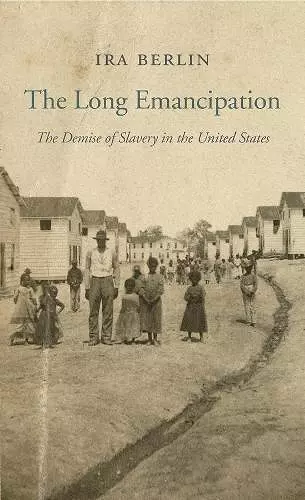The Long Emancipation
The Demise of Slavery in the United States
Format:Paperback
Publisher:Harvard University Press
Published:30th Nov '18
Currently unavailable, and unfortunately no date known when it will be back

Perhaps no event in American history arouses more impassioned debate than the abolition of slavery. Answers to basic questions about who ended slavery, how, and why remain fiercely contested more than a century and a half after the passage of the Thirteenth Amendment. In The Long Emancipation, Ira Berlin draws upon decades of study to offer a framework for understanding slavery’s demise in the United States. Freedom was not achieved in a moment, and emancipation was not an occasion but a near-century-long process—a shifting but persistent struggle that involved thousands of men and women.
“Ira Berlin ranks as one of the greatest living historians of slavery in the United States… The Long Emancipation offers a useful reminder that abolition was not the charitable work of respectable white people, or not mainly that. Instead, the demise of slavery was made possible by the constant discomfort inflicted on middle-class white society by black activists. And like the participants in today’s Black Lives Matter movement, Berlin has not forgotten that the history of slavery in the United States—especially the history of how slavery ended—is never far away when contemporary Americans debate whether their nation needs to change.”
—Edward E. Baptist, New York Times Book Review
Ira Berlin ranks as one of the greatest living historians of slavery in the United States… The Long Emancipation offers a useful reminder that abolition was not the charitable work of respectable white people, or not mainly that. Instead, the demise of slavery was made possible by the constant discomfort inflicted on middle-class white society by black activists. And like the participants in today’s Black Lives Matter movement, Berlin has not forgotten that the history of slavery in the United States—especially the history of how slavery ended—is never far away when contemporary Americans debate whether their nation needs to change. -- Edward E. Baptist * New York Times Book Review *
The cause of the end of slavery in the U.S. is a long, complex story that is usually, in the general reading public’s mind, simplified by ‘the Civil War ended it.’ In this remarkably cogent, impressively thought-out, and even beautifully styled account by a university historian, we are given emphatic witness to his long-held professional conviction that ‘freedom’s arrival,’ as he phrases it, was not due to a ‘moment or a man’ but because of a process that took a century to unfold. -- Brad Hooper * Booklist (starred review) *
A short, fast-paced interpretive history of the transition of African Americans from chattels to free persons. [Berlin] challenges previous scholars who identify both a ‘moment’ and a human factor that sparked emancipation—generally either President Abraham Lincoln or the South’s slaves—for initiating slavery’s overthrow. Instead, Berlin takes the long view in charting emancipation’s circuitous metamorphosis, from the late 18th century until the 1860s… In the end, Berlin credits black persons, north and south, for gradually but forcefully removing slavery’s stain from the fabric of American life. -- J. D. Smith * Choice *
Berlin lucidly illuminates the ‘near-century-long’ process of abolition and how, in many ways, the work of emancipation continues today. * Publishers Weekly *
- Nominated for Lincoln Prize 2016
- Nominated for OAH Liberty Legacy Foundation Award 2016
- Nominated for Avery O. Craven Award 2016
- Nominated for James A. Rawley Prize 2016
- Nominated for Anisfield-Wolf Book Awards 2016
ISBN: 9780674986558
Dimensions: unknown
Weight: unknown
240 pages